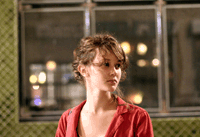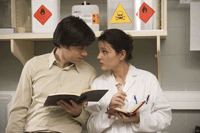 Love Songs, 2007. Christophe Honoré’s idiosyncratic concoction of irreverent humor, subverted expectation, romanticism, and affectionate homage falls elegantly and poignantly into place in Love Songs (Les Chansons d’amour): a lyrical, immediately engaging, yet substantive thirteen song musical presented in three chapters, each bearing a title from the three parts of Jacques Demy’s The Umbrellas of Cherbourg (Departure, Absence, and Return). The unexpected presentation of the film’s opening credit sequence – citing only the surnames of the actors and production crew – sets the tone for Honoré’s whimsical exploration of loss, incompleteness, and emotional fracture. Ostensibly a film on the amorous (mis)adventures of indecisive, twenty-something Parisian copy writer, Ismaël (Louis Garrel) who, as the film begins, has embarked on a ménage à trois with the reluctant consent of his devoted girlfriend, Julie (Ludivine Sangnier) and his co-worker Alice (Clotilde Hesme), the film similarly sweeps through the variegated arcs of Demy’s quintessential film as it traces the complex emotional trajectory of loss, grief, survival, and healing following an unexpected tragedy. However, Honoré’s rumination on lost love is far from a derivative reconstitution, but rather, a contemporary examination of the malleability – and interchangeability – of modern identity. Featuring original songs by collaborator and friend Alex Beaupain (whose experienced loss of a mutual friend served as the inspiration for the film’s narrative) and a strong ensemble cast who perform the musical numbers in their own unadulterated voices – including Brigitte Roüan in the role of Julie’s mother, Chiara Mastroianni as Julie’s sister Jeanne, and Grégoire Leprince-Ringuet as the idealistic Breton student, Erwann – Love Songs delightfully (and unabashedly) expresses the poetry in the quotidian in all its intoxicating, dislocated presence and bittersweet, lingering memory.
Love Songs, 2007. Christophe Honoré’s idiosyncratic concoction of irreverent humor, subverted expectation, romanticism, and affectionate homage falls elegantly and poignantly into place in Love Songs (Les Chansons d’amour): a lyrical, immediately engaging, yet substantive thirteen song musical presented in three chapters, each bearing a title from the three parts of Jacques Demy’s The Umbrellas of Cherbourg (Departure, Absence, and Return). The unexpected presentation of the film’s opening credit sequence – citing only the surnames of the actors and production crew – sets the tone for Honoré’s whimsical exploration of loss, incompleteness, and emotional fracture. Ostensibly a film on the amorous (mis)adventures of indecisive, twenty-something Parisian copy writer, Ismaël (Louis Garrel) who, as the film begins, has embarked on a ménage à trois with the reluctant consent of his devoted girlfriend, Julie (Ludivine Sangnier) and his co-worker Alice (Clotilde Hesme), the film similarly sweeps through the variegated arcs of Demy’s quintessential film as it traces the complex emotional trajectory of loss, grief, survival, and healing following an unexpected tragedy. However, Honoré’s rumination on lost love is far from a derivative reconstitution, but rather, a contemporary examination of the malleability – and interchangeability – of modern identity. Featuring original songs by collaborator and friend Alex Beaupain (whose experienced loss of a mutual friend served as the inspiration for the film’s narrative) and a strong ensemble cast who perform the musical numbers in their own unadulterated voices – including Brigitte Roüan in the role of Julie’s mother, Chiara Mastroianni as Julie’s sister Jeanne, and Grégoire Leprince-Ringuet as the idealistic Breton student, Erwann – Love Songs delightfully (and unabashedly) expresses the poetry in the quotidian in all its intoxicating, dislocated presence and bittersweet, lingering memory.
 La Question humaine, 2007. In an interstitial episode the occurs halfway through the film, a group of diners at a low rent café are racially profiled and rounded up by the police for a random check of identification papers, the first among them, Papi (Adama Doumbia), the African immigrant whose wife, Blandine (Noëlla Mossaba) was injured during deportation in Nicolas Klotz’s previous film, La Blessure. It is a jarring contrast from the world of indulgence, privilege, ivy league education, and corporate grooming that would define the characters in La Question humaine, the final installment in what Klotz would describe during the film’s introductory remarks as the Trilogy of Modern Times (along with Paria and La Blessure), in tribute to Charles Chaplin: an interrogation of society’s conscience – its humanity – at the beginning of the 21st century, a century after the Industrial Revolution. Adapted from the novel by Belgian author François Emmanuel, the film is set within the fictitious global conglomerate called SC Farb, a thinly veiled reference to the notorious, Nazi-era, German chemical company IG Farben whose dismantled and reacquired industries include the French multinational pharmaceutical corporation Aventis (which subsequently merged into the Sanofi-Aventis that is headquartered in Paris). Ostensibly centered on corporate psychologist and executive trainer, Simon Kessler’s (Mathieu Amalric) attempts to perform a covert evaluation of the CEO, Mathias Jüst’s (Michael Lonsdale) mental health at the request of a high-ranking executive, Karl Rose (Jean-Pierre Kalfon) following a series of erratic behaviors and questionable actions, the film chronicles Kessler’s own moral awakening after gaining Jüst’s trust by drawing on the memory of a company quartet that he had formed years earlier with Rose, his then-mistress Lynn Sanderson (Valérie Dréville), and former employee Arie Neumann (Lou Castel), and uncovers the closely guarded secrets that would bind the amateur musicians together in the buried knowledge of a shameful collective history. Framed as a mystery and corporate intrigue film, La Question humaine is a scathing and unflinching indictment of the societal toll of corporate economics, where efficiency, optimization, productivity, and profitability are used as evasive euphemisms for inhumanity, exploitation, and social genocide. Klotz uses cold tones, dark contrast palettes, and institutional spaces that figuratively mirror the grey souls of corporate white-washing and amnesia, where new generations (a sentiment acutely embodied in the incorporation of New Order music during a rave party attended by newly recruited employees) systematically collude to bury the transgressions of their forefathers in order to avoid confronting the past and consequently deflect their own personal accountability and sense of moral restitution.
La Question humaine, 2007. In an interstitial episode the occurs halfway through the film, a group of diners at a low rent café are racially profiled and rounded up by the police for a random check of identification papers, the first among them, Papi (Adama Doumbia), the African immigrant whose wife, Blandine (Noëlla Mossaba) was injured during deportation in Nicolas Klotz’s previous film, La Blessure. It is a jarring contrast from the world of indulgence, privilege, ivy league education, and corporate grooming that would define the characters in La Question humaine, the final installment in what Klotz would describe during the film’s introductory remarks as the Trilogy of Modern Times (along with Paria and La Blessure), in tribute to Charles Chaplin: an interrogation of society’s conscience – its humanity – at the beginning of the 21st century, a century after the Industrial Revolution. Adapted from the novel by Belgian author François Emmanuel, the film is set within the fictitious global conglomerate called SC Farb, a thinly veiled reference to the notorious, Nazi-era, German chemical company IG Farben whose dismantled and reacquired industries include the French multinational pharmaceutical corporation Aventis (which subsequently merged into the Sanofi-Aventis that is headquartered in Paris). Ostensibly centered on corporate psychologist and executive trainer, Simon Kessler’s (Mathieu Amalric) attempts to perform a covert evaluation of the CEO, Mathias Jüst’s (Michael Lonsdale) mental health at the request of a high-ranking executive, Karl Rose (Jean-Pierre Kalfon) following a series of erratic behaviors and questionable actions, the film chronicles Kessler’s own moral awakening after gaining Jüst’s trust by drawing on the memory of a company quartet that he had formed years earlier with Rose, his then-mistress Lynn Sanderson (Valérie Dréville), and former employee Arie Neumann (Lou Castel), and uncovers the closely guarded secrets that would bind the amateur musicians together in the buried knowledge of a shameful collective history. Framed as a mystery and corporate intrigue film, La Question humaine is a scathing and unflinching indictment of the societal toll of corporate economics, where efficiency, optimization, productivity, and profitability are used as evasive euphemisms for inhumanity, exploitation, and social genocide. Klotz uses cold tones, dark contrast palettes, and institutional spaces that figuratively mirror the grey souls of corporate white-washing and amnesia, where new generations (a sentiment acutely embodied in the incorporation of New Order music during a rave party attended by newly recruited employees) systematically collude to bury the transgressions of their forefathers in order to avoid confronting the past and consequently deflect their own personal accountability and sense of moral restitution.
 Let’s Dance, 2007. Noémie Lvovsky returns to the idiosyncratic, subtly modulated multigenerational human comedy of Les Sentiments with a more diluted, but still insightfully rendered examination of aging, identity, and the changing role between parent and child in Let’s Dance. Lvovsky’s affectionate portrait centers on the sprightly, Holocaust survivor Salomon Bellinsky (Jean-Pierre Marielle) who, as he nears his eightieth birthday, has been spending his days dodging funeral obligations of friends and fellow survivors, taking tap dancing lessons to emulate his favorite actor, Fred Astaire, arguing with insurance agents who are quick to reject his application on the sole basis of age, and paying cordial visits to his willfully independent, estranged wife Geneviève (Bulle Ogier) who has been reduced to increasing financial straits after struggling with the effects of Alzheimer’s disease for years, attended to her devoted caregiver, Mootoosamy (Bakary Sangaré). Faced with the reality that his wife is now a virtual stranger in the final stages of her degenerative illness, and relegated to obligatory, quick checkup visits from his preoccupied daughter, Sarah (Valeria Bruni Tedeschi), Salomon turns to the personal ads to find companionship and meets the charming, if insecure Violette (Sabine Azéma), where soon, his own fears of an uncertain future begin to take their toll on his relationships with the people around him. As in Les Sentiments, Lvovsky frames the parallel lives among the disparate generations as emotional intersections that reveal the fundamental human desire to remain vital, useful, and relevant.
Let’s Dance, 2007. Noémie Lvovsky returns to the idiosyncratic, subtly modulated multigenerational human comedy of Les Sentiments with a more diluted, but still insightfully rendered examination of aging, identity, and the changing role between parent and child in Let’s Dance. Lvovsky’s affectionate portrait centers on the sprightly, Holocaust survivor Salomon Bellinsky (Jean-Pierre Marielle) who, as he nears his eightieth birthday, has been spending his days dodging funeral obligations of friends and fellow survivors, taking tap dancing lessons to emulate his favorite actor, Fred Astaire, arguing with insurance agents who are quick to reject his application on the sole basis of age, and paying cordial visits to his willfully independent, estranged wife Geneviève (Bulle Ogier) who has been reduced to increasing financial straits after struggling with the effects of Alzheimer’s disease for years, attended to her devoted caregiver, Mootoosamy (Bakary Sangaré). Faced with the reality that his wife is now a virtual stranger in the final stages of her degenerative illness, and relegated to obligatory, quick checkup visits from his preoccupied daughter, Sarah (Valeria Bruni Tedeschi), Salomon turns to the personal ads to find companionship and meets the charming, if insecure Violette (Sabine Azéma), where soon, his own fears of an uncertain future begin to take their toll on his relationships with the people around him. As in Les Sentiments, Lvovsky frames the parallel lives among the disparate generations as emotional intersections that reveal the fundamental human desire to remain vital, useful, and relevant.
 All Is Forgiven, 2007. Originally produced by Humbert Balsan before his death in 2005, Mia Hansen-Løve’s All Is Forgiven recalls the muted, slow brewing, slice of life implosions of Stefan Krohmer’s Summer 04 and Valeska Grisebach’s Longing, as well as the naturalistic, organic narrative and chance intersections of Barbara Albert’s cinema to create a raw and distilled, yet intimate and insightfully rendered rumination on the nature of connection, longing, regret, and forgiveness. Composed of a series of elliptical, self-contained episodes of the quotidian that collectively reveal the fragments of a disintegrating relationship, the film is also a reflection of human memory in its lucid, essential reconstitution – and awareness – of (life)time passed: Annette’s (Marie-Christine Friedrich) frequent castigation of Victor’s (Paul Blain) excessive drinking, his frequent absences from family outings with their daughter Pamela (Victoire Rousseau) to meet a drug dealer, his increasing disenchantment with his life as an underemployed translator and frustrated poet in Vienna that would lead to their decision to uproot the family move back to Paris, a conversation between Victor and his sister, Martine (Carole Franck) that exposes the fissures in his passionate, but volatile relationship with his devoted and long-suffering partner, a chance encounter with a drug dealer’s friend, Gisèle (Olivia Ross) during a party that would lead him to the abyss of heroin addiction, and ultimately, his separation from his family. Shot using hand-held DV cameras, Hansen-Løve’s aesthetic juxtaposition of saturated light against vérité-styled images that convey a sense of raw immediacy creates an unexpected coherence between disparate images that evokes the spirit of German Romanticism in its expositions on the duality of nature. It is this poetic transfiguration of the banal that is implicitly revealed in Victor’s letter to his absent daughter, now an adolescent (Constance Rousseau), a passage adapted from Romantic poet Joseph Freiherr von Eichendorff that articulates both the reassurance of eternal devotion and regret of missed opportunity.
All Is Forgiven, 2007. Originally produced by Humbert Balsan before his death in 2005, Mia Hansen-Løve’s All Is Forgiven recalls the muted, slow brewing, slice of life implosions of Stefan Krohmer’s Summer 04 and Valeska Grisebach’s Longing, as well as the naturalistic, organic narrative and chance intersections of Barbara Albert’s cinema to create a raw and distilled, yet intimate and insightfully rendered rumination on the nature of connection, longing, regret, and forgiveness. Composed of a series of elliptical, self-contained episodes of the quotidian that collectively reveal the fragments of a disintegrating relationship, the film is also a reflection of human memory in its lucid, essential reconstitution – and awareness – of (life)time passed: Annette’s (Marie-Christine Friedrich) frequent castigation of Victor’s (Paul Blain) excessive drinking, his frequent absences from family outings with their daughter Pamela (Victoire Rousseau) to meet a drug dealer, his increasing disenchantment with his life as an underemployed translator and frustrated poet in Vienna that would lead to their decision to uproot the family move back to Paris, a conversation between Victor and his sister, Martine (Carole Franck) that exposes the fissures in his passionate, but volatile relationship with his devoted and long-suffering partner, a chance encounter with a drug dealer’s friend, Gisèle (Olivia Ross) during a party that would lead him to the abyss of heroin addiction, and ultimately, his separation from his family. Shot using hand-held DV cameras, Hansen-Løve’s aesthetic juxtaposition of saturated light against vérité-styled images that convey a sense of raw immediacy creates an unexpected coherence between disparate images that evokes the spirit of German Romanticism in its expositions on the duality of nature. It is this poetic transfiguration of the banal that is implicitly revealed in Victor’s letter to his absent daughter, now an adolescent (Constance Rousseau), a passage adapted from Romantic poet Joseph Freiherr von Eichendorff that articulates both the reassurance of eternal devotion and regret of missed opportunity.
 The Feelings Factory, 2008. For successful, attractive, career-minded, thirty-something real estate attorney, Éloïse (Elsa Zylberstein), there is a certain efficiency and reassuring sense of retained control in the dynamics of speed dating that proves particularly appealing: seven pre-selected men, seven minute face-to-face meetings to form – and leave – an impression and exchange information that, at the end of each allotted time, allows each participant to start anew no matter how promising or disastrous the previous encounter proved to be, and, at the end of the evening, the flexibility to pursue or reject a subsequent relationship with any or all of the eligible bachelors or simply walk away. At first, the rapid fire pace of the encounters proves awkward, reducing the conversations to polite small talk, uncomfortable silences, reflexive regurgitations of one’s curriculum vitae, or impromptu interrogations that attempt to dissect the failures of past relationships as a means of evaluating future compatibility. Nevertheless, Éloïse remains unfazed, sensing a potentially suitable complement in the handsome, self-assured trial lawyer, Jean-Luc (Bruno Putzulu), even as she finds a momentary, if reluctant connection with the insecure, neurotic André (Jacques Bonnaffé) amidst the din and haze of the evening’s self-induced emotional rollercoaster. But the cracks in Éloïse’s carefully controlled existence have already begun to surface, metastasizing in bouts fainting spells, unexplained physiological changes, and panic attacks that would soon send her to a series of medical specialists in search of proper diagnosis and treatment. Struggling with the physical and emotional toll of her increasingly complicated professional and personal life, Éloïse is forced to set aside her romantic ideals of finding perfect love in order to confront the mundane reality of her debilitating (and life-altering) illness. Expounding on his earlier film, Work Hard, Play Hard, Jean-Marc Moutout’s The Feelings Factory similarly captures the anxieties of urban existence, industrialization, modern identity, and disposability. At the core of Moutout’s articulate and lucid contemporary portrait of love in an age of technological convenience (and anonymity) is Zylberstein’s remarkable, subtly modulated performance – alternately struggling between pragmatism and quixotic romanticism – where the human heart, too, is a compromised, tradable commodity of instant gratification, weighed options, and accepted risk.
The Feelings Factory, 2008. For successful, attractive, career-minded, thirty-something real estate attorney, Éloïse (Elsa Zylberstein), there is a certain efficiency and reassuring sense of retained control in the dynamics of speed dating that proves particularly appealing: seven pre-selected men, seven minute face-to-face meetings to form – and leave – an impression and exchange information that, at the end of each allotted time, allows each participant to start anew no matter how promising or disastrous the previous encounter proved to be, and, at the end of the evening, the flexibility to pursue or reject a subsequent relationship with any or all of the eligible bachelors or simply walk away. At first, the rapid fire pace of the encounters proves awkward, reducing the conversations to polite small talk, uncomfortable silences, reflexive regurgitations of one’s curriculum vitae, or impromptu interrogations that attempt to dissect the failures of past relationships as a means of evaluating future compatibility. Nevertheless, Éloïse remains unfazed, sensing a potentially suitable complement in the handsome, self-assured trial lawyer, Jean-Luc (Bruno Putzulu), even as she finds a momentary, if reluctant connection with the insecure, neurotic André (Jacques Bonnaffé) amidst the din and haze of the evening’s self-induced emotional rollercoaster. But the cracks in Éloïse’s carefully controlled existence have already begun to surface, metastasizing in bouts fainting spells, unexplained physiological changes, and panic attacks that would soon send her to a series of medical specialists in search of proper diagnosis and treatment. Struggling with the physical and emotional toll of her increasingly complicated professional and personal life, Éloïse is forced to set aside her romantic ideals of finding perfect love in order to confront the mundane reality of her debilitating (and life-altering) illness. Expounding on his earlier film, Work Hard, Play Hard, Jean-Marc Moutout’s The Feelings Factory similarly captures the anxieties of urban existence, industrialization, modern identity, and disposability. At the core of Moutout’s articulate and lucid contemporary portrait of love in an age of technological convenience (and anonymity) is Zylberstein’s remarkable, subtly modulated performance – alternately struggling between pragmatism and quixotic romanticism – where the human heart, too, is a compromised, tradable commodity of instant gratification, weighed options, and accepted risk.
 Shall We Kiss, 2007. The possible implications of an innocent kiss hover like a dark cloud over the almost perfect evening out between an attractive, out-of-town textile designer, Émilie (Julie Gayet) and good Samaritan Gabriel (Michaël Cohen) in Emmanuel Mouret’s refined and effervescent comedy of manners. Unfolding as a story within a story as Émilie attempts to explain her insistence against capping off their casual dinner date with an almost obligatory goodbye kiss that, with both parties involved in committed relationships and Émilie on the last day of her business trip before heading home the next morning, would seem an innocuous enough request, she recounts the emotionally prickly tale of another pair of erstwhile innocent kissers, Judith (Virginie Ledoyen) and Nicolas (Emmanuel Mouret) whose polite gestures and good intentions lead to unexpected catastrophe. At the heart of the story is the ever-analytical and pragmatic Judith, a laboratory researcher who has been happily married to pharmacist Claudio (Stefano Accorsi) for several years. Always eager to lend a sympathetic ear to her best friend Nicolas who has fallen into an inextricable romantic slump after having ended a long-term relationship with a mutual friend, Judith has become a close confidante to Nicolas’s neurotic tales of self-defeating, frustrated intimacy – fearful of returning to the dating scene without appearing too desperate after having been celibate for so long, yet unable to summarily consummate the physical act and snap his dry spell by hiring a prostitute when she prevents him from kissing her as a prelude to their mechanical coupling. As a remedy to the impasse, Judith suggests that she serve as Nicolas’s surrogate, rationalizing that their friendship would fill the semblance of emotional connection that he seeks to be able to consummate an act of intimacy. However, when Judith’s selfless act of intervention proves to be less than resolved despite Nicolas’s newfound relationship with a sexy fight attendant, Câline (Fréderique Bel), the two are forced to confront the Pandora’s box of confused emotions and irrationality that their meaningless encounter has caused. Favorably evoking Woody Allen’s witty, self-deprecating humor combined coupled with the clinical observations of human interaction (and dysfunction) inherent in Eric Rohmer’s cinema, Shall We Kiss?, nevertheless, bears the imprint of Mouret’s characteristic, tightly woven construction – a subtle choreography of words, scenarios, elisions, and ambience that, in turn, reflect the ephemeral alchemy of human connection and desire.
Shall We Kiss, 2007. The possible implications of an innocent kiss hover like a dark cloud over the almost perfect evening out between an attractive, out-of-town textile designer, Émilie (Julie Gayet) and good Samaritan Gabriel (Michaël Cohen) in Emmanuel Mouret’s refined and effervescent comedy of manners. Unfolding as a story within a story as Émilie attempts to explain her insistence against capping off their casual dinner date with an almost obligatory goodbye kiss that, with both parties involved in committed relationships and Émilie on the last day of her business trip before heading home the next morning, would seem an innocuous enough request, she recounts the emotionally prickly tale of another pair of erstwhile innocent kissers, Judith (Virginie Ledoyen) and Nicolas (Emmanuel Mouret) whose polite gestures and good intentions lead to unexpected catastrophe. At the heart of the story is the ever-analytical and pragmatic Judith, a laboratory researcher who has been happily married to pharmacist Claudio (Stefano Accorsi) for several years. Always eager to lend a sympathetic ear to her best friend Nicolas who has fallen into an inextricable romantic slump after having ended a long-term relationship with a mutual friend, Judith has become a close confidante to Nicolas’s neurotic tales of self-defeating, frustrated intimacy – fearful of returning to the dating scene without appearing too desperate after having been celibate for so long, yet unable to summarily consummate the physical act and snap his dry spell by hiring a prostitute when she prevents him from kissing her as a prelude to their mechanical coupling. As a remedy to the impasse, Judith suggests that she serve as Nicolas’s surrogate, rationalizing that their friendship would fill the semblance of emotional connection that he seeks to be able to consummate an act of intimacy. However, when Judith’s selfless act of intervention proves to be less than resolved despite Nicolas’s newfound relationship with a sexy fight attendant, Câline (Fréderique Bel), the two are forced to confront the Pandora’s box of confused emotions and irrationality that their meaningless encounter has caused. Favorably evoking Woody Allen’s witty, self-deprecating humor combined coupled with the clinical observations of human interaction (and dysfunction) inherent in Eric Rohmer’s cinema, Shall We Kiss?, nevertheless, bears the imprint of Mouret’s characteristic, tightly woven construction – a subtle choreography of words, scenarios, elisions, and ambience that, in turn, reflect the ephemeral alchemy of human connection and desire.
 Un Secret, 2007. In an early episode in the film, a bookish, teenaged François Grimbert (Quentin Dubuis) sits in a classroom intently watching the archival footage of the mass collection and burial of concentration camp victims during the Holocaust, before flying into an inconsolable rage over a student’s racially insensitive comments. For François, the sobering images of emaciated, broken bodies not only raises the specter of his suppressed identity after his parents Anglicized their surname and had him baptized as a Catholic in the aftermath of their untold experience during the war, but also reminds him of his own physical frailty. The son of athletic parents, a ruggedly handsome gymnast and haberdasher named Maxime (Patrick Bruel) and his beautiful, fashion model wife, Tania (Cécile De France), François’s self-consciousness over his own physicality has plagued him since childhood, even imagining that he had an athletic, alter-ego brother who could climb the ropes and execute perfectly controlled turns on the high bar that he could not perform for his demanding father. Even the idea of his parents humoring his fanciful whims for an imaginary brother would prove to be elusive, answered instead with almost desperate re-assertion of their singular existence. It is a gnawing sense of insecurity over his parents’ evasive silence that would continue to consume him until one day when the family’s longtime friend and neighbor, Louise (Julie Depardieu) decides to tell François the story of his parents’ entangled destiny of unreconciled ghosts and memories in the shadows of occupied France. Adapted from the novel Memory (Secret) by Philippe Grimbert, Claude Miller’s film is an articulate and well-rendered, if occasionally belabored portrait of guilt, transference, and survival. Framed within the context of the now grown François’s (Mathieu Amalric) attempts to find his missing elderly father following the accidental death of the family dog, his search also becomes a metaphoric quest for identity and connection within the silence of a traumatic and dislocated history (a haunted persistence that also evokes integral, recurring themes in Chantal Akerman’s cinema).
Un Secret, 2007. In an early episode in the film, a bookish, teenaged François Grimbert (Quentin Dubuis) sits in a classroom intently watching the archival footage of the mass collection and burial of concentration camp victims during the Holocaust, before flying into an inconsolable rage over a student’s racially insensitive comments. For François, the sobering images of emaciated, broken bodies not only raises the specter of his suppressed identity after his parents Anglicized their surname and had him baptized as a Catholic in the aftermath of their untold experience during the war, but also reminds him of his own physical frailty. The son of athletic parents, a ruggedly handsome gymnast and haberdasher named Maxime (Patrick Bruel) and his beautiful, fashion model wife, Tania (Cécile De France), François’s self-consciousness over his own physicality has plagued him since childhood, even imagining that he had an athletic, alter-ego brother who could climb the ropes and execute perfectly controlled turns on the high bar that he could not perform for his demanding father. Even the idea of his parents humoring his fanciful whims for an imaginary brother would prove to be elusive, answered instead with almost desperate re-assertion of their singular existence. It is a gnawing sense of insecurity over his parents’ evasive silence that would continue to consume him until one day when the family’s longtime friend and neighbor, Louise (Julie Depardieu) decides to tell François the story of his parents’ entangled destiny of unreconciled ghosts and memories in the shadows of occupied France. Adapted from the novel Memory (Secret) by Philippe Grimbert, Claude Miller’s film is an articulate and well-rendered, if occasionally belabored portrait of guilt, transference, and survival. Framed within the context of the now grown François’s (Mathieu Amalric) attempts to find his missing elderly father following the accidental death of the family dog, his search also becomes a metaphoric quest for identity and connection within the silence of a traumatic and dislocated history (a haunted persistence that also evokes integral, recurring themes in Chantal Akerman’s cinema).
 Ain’t Scared, 2007. During the Q&A for Ain’t Scared, Audrey Estrougo remarked that one of her motivations for making the film was to create a more authentic portrait of les cités – the low income housing neighborhoods on the outskirts of the city – that had become an all too convenient political target for all the social ills of France by then right wing candidate, Nicolas Sarkozy during the presidential election, especially in the aftermath of the 2005 civil unrest. Within this context, it should come as no surprise that Estrougo finds certain kinship with the films of Spike Lee in capturing the sense of entrapment, poverty, despair, and frustration that lead to these eruptions of violence. Composed as a two-part chronicle (with epilogue) of a day in the life of residents at a housing project – initially, from the perspective of the young men, then subsequently, from the young women in the neighborhood – Estrougo proposes that violence and social inequality are not overtly issues of racism, but rather, a broader symptom of underprivilege and disenfranchisement. Indeed, Estrougo subverts this convenient generalization in the early establishing shot of Yannick (Paco Boublard) receiving money inside a parked car before trying to catch a glimpse of his ex-girlfriend, Melissa (Djena Tsimba), his friend Jo (Terry Nimajimbe), who has been training for his debut with a professional soccer league, and even in the image of a bare-chested Mouss (Oumar Diaw) practicing an assortment of romantic overtures in front of a mirror that would later prove to actually succeed in seducing his girlfriend, Daphné (Salomé Stévenin). In contrast, the plight of the women is harsher and more restrictive: a reality that is foreshadowed in the film’s black screen opening sequence as two women scandalously argue over the stealing of a lover (later identified as Melissa’s mother and her neighbor) that ends with the slamming of a door, that is subsequently mirrored in the escalating rivalry between Jo’s girlfriend, Julie (Emilie de Preissac) and Mouss’s younger sister, Fatima (Eye Haidara) that dominates the second half of the film. Paradoxically, it is through this sobering glimpse of petty territoriality and jealousy that Estrougo not only reinforces the idea of violence as an integral reflection of poverty, dispossession, and exclusion, but also offers a semblance of hope and solidarity.
Ain’t Scared, 2007. During the Q&A for Ain’t Scared, Audrey Estrougo remarked that one of her motivations for making the film was to create a more authentic portrait of les cités – the low income housing neighborhoods on the outskirts of the city – that had become an all too convenient political target for all the social ills of France by then right wing candidate, Nicolas Sarkozy during the presidential election, especially in the aftermath of the 2005 civil unrest. Within this context, it should come as no surprise that Estrougo finds certain kinship with the films of Spike Lee in capturing the sense of entrapment, poverty, despair, and frustration that lead to these eruptions of violence. Composed as a two-part chronicle (with epilogue) of a day in the life of residents at a housing project – initially, from the perspective of the young men, then subsequently, from the young women in the neighborhood – Estrougo proposes that violence and social inequality are not overtly issues of racism, but rather, a broader symptom of underprivilege and disenfranchisement. Indeed, Estrougo subverts this convenient generalization in the early establishing shot of Yannick (Paco Boublard) receiving money inside a parked car before trying to catch a glimpse of his ex-girlfriend, Melissa (Djena Tsimba), his friend Jo (Terry Nimajimbe), who has been training for his debut with a professional soccer league, and even in the image of a bare-chested Mouss (Oumar Diaw) practicing an assortment of romantic overtures in front of a mirror that would later prove to actually succeed in seducing his girlfriend, Daphné (Salomé Stévenin). In contrast, the plight of the women is harsher and more restrictive: a reality that is foreshadowed in the film’s black screen opening sequence as two women scandalously argue over the stealing of a lover (later identified as Melissa’s mother and her neighbor) that ends with the slamming of a door, that is subsequently mirrored in the escalating rivalry between Jo’s girlfriend, Julie (Emilie de Preissac) and Mouss’s younger sister, Fatima (Eye Haidara) that dominates the second half of the film. Paradoxically, it is through this sobering glimpse of petty territoriality and jealousy that Estrougo not only reinforces the idea of violence as an integral reflection of poverty, dispossession, and exclusion, but also offers a semblance of hope and solidarity.
Acquarello, 2008 [reprinted]